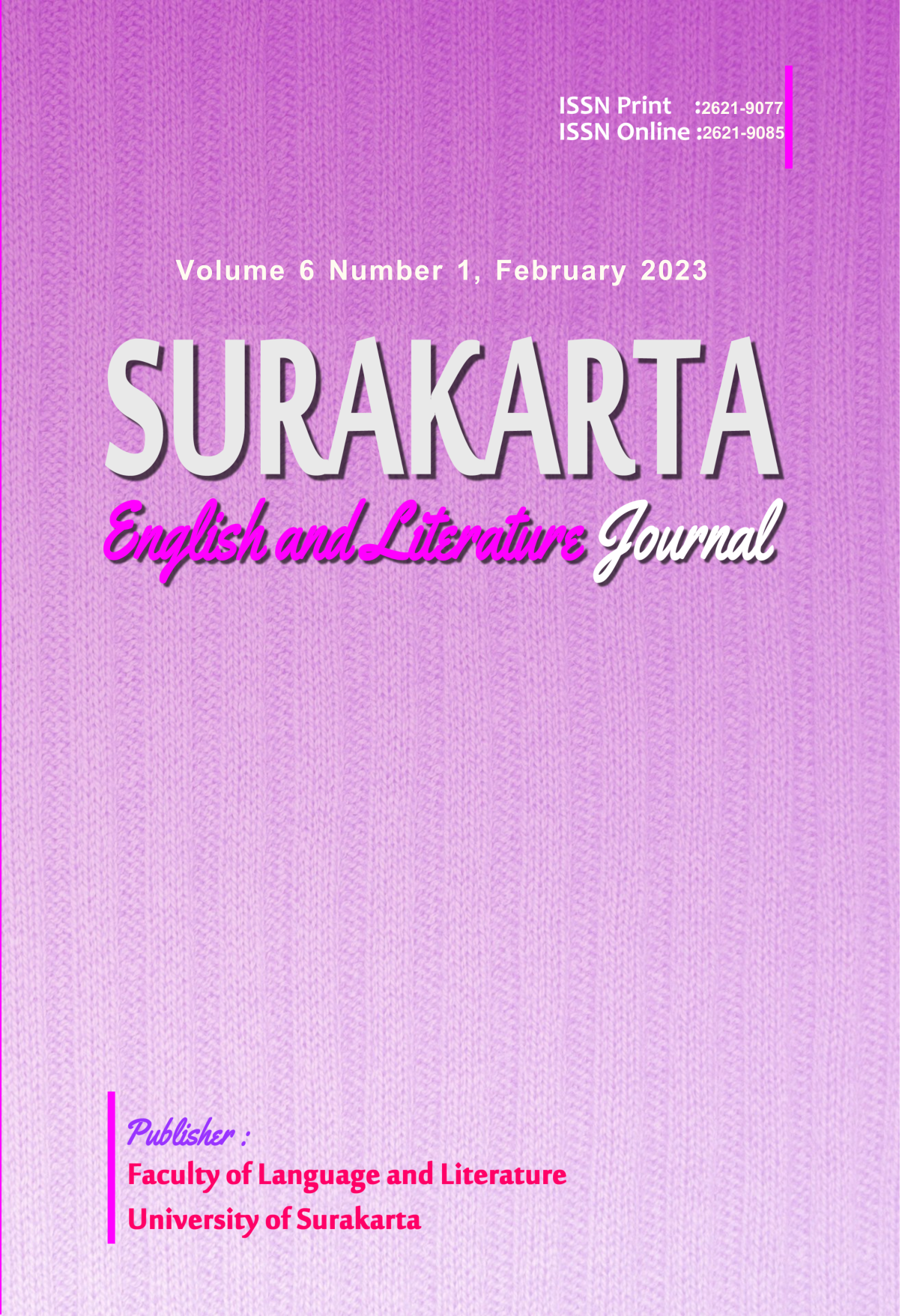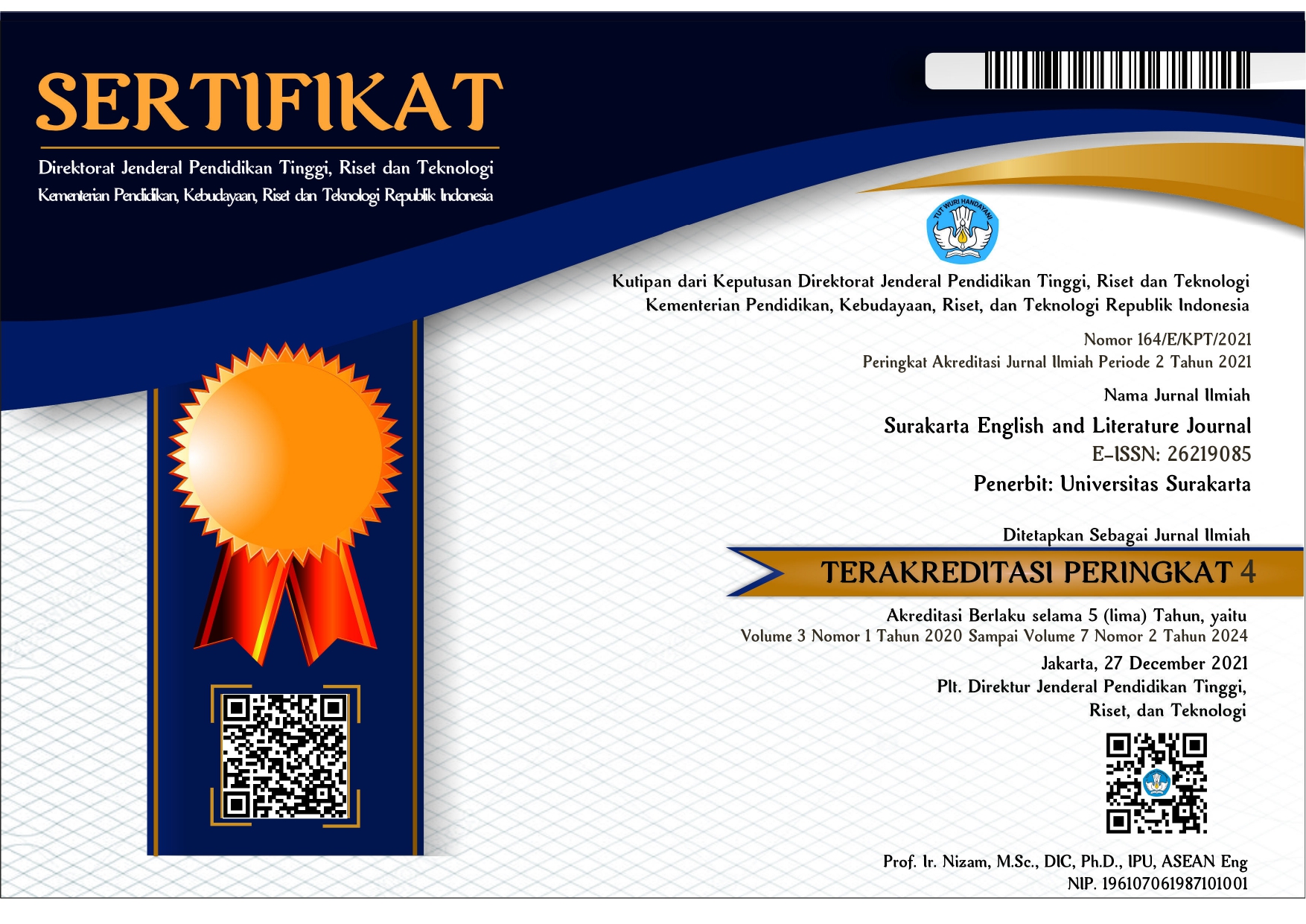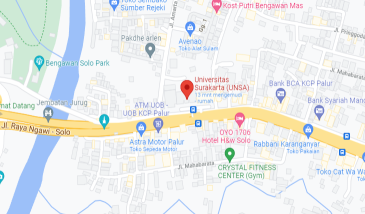Teachers’ Challenges and Students’ Response to Project-Based Learning in English Subject
DOI:
https://doi.org/10.52429/selju.v6i1.116Keywords:
Project-Based Learning, English, SMK Kesehatan Kaltara TarakanAbstract
This study was conducted to (1) describe project-based learning in the English subject at the vocational high school (SMK Kesehatan Kaltara); (2) describe the challenges or difficulties English teachers encountered in implementing project-based learning in the English subject at the vocational high school (SMK Kesehatan Kaltara); and (3) reveal the students’ responses on PjBL implementation. This study applied a mixed method (Creswell, 2014). The data were collected with observation, questionnaires, and interviews. Then, they were analyzed using the Miles and Huberman formula, including data reduction, data display, and conclusions: drawing/verifying. Based on the analysis, the findings indicate that: (1) English teachers at the school had successfully implemented project-based learning; and (2) the teachers found some following problems: lack of time, learning resources and tools in preparation, difficulty in distributing the whole topic for different groups, time limitation in the class, difficulty in monitoring the activities of the groups and their members, (3) in general the students have positive responses on all learning aspects.
References
Aghayani, B., & Hajmohammadi, E. (2019). Project-based learning: Promoting EFL learners’ writing skills. LLT Journal: A Journal on Language and Language Teaching, 22(1), 78–85.
Ahmad, J. (2011). Interdisciplinary journal of contemporary research in business intentional vs. Incidental vocabulary learning.
Anderson, B. (2009). Affective Atmospheres. Emotion, Space and Society, 2, 77–81. https://doi.org/10.1016/j.emospa.2009.08.005
Angga Gunantar, D. (2016). The impact of English as an international language on English language teaching in Indonesia. LANGUAGE CIRCLE: Journal of Language and Literature, 10(1). http://journal.unnes.ac.id
Anisa, I. (2019). Case study of the teaching and learning English for junior high school students. Surakarta English and Literature Journal, 2(1), 9–17.
Arianti, A. (2021). A study of students’ efforts to improve the ability in English. Surakarta English and Literature Journal, 4(1), 1–10.
Asfihana, R., Salija, K., Iskandar, I., & Garim, I. (2022). Students’ English Learning Experiences on Virtual Project-Based Learning Instruction. International Journal of Language Education, 6(2), 196. https://doi.org/10.26858/ijole.v6i2.20506
Astawa, N. L. P. N. S. P., Artini, L. P., & Nitiasih, P. K. (2017). Project-based Learning Activities and EFL Students’ Productive Skills in English. Journal of Language Teaching and Research, 8(6), 1147. https://doi.org/10.17507/jltr.0806.16
Astuti, W. (2021). The use of project based learning in teaching English at second grade of SMP Negeri 1 Barru (quasi-experimental research).
Cooper, K. S. (2014). Eliciting Engagement in the High School Classroom: A Mixed-Methods Examination of Teaching Practices. American Educational Research Journal, 51(2), 363–402.
Creswell, J. W. (2014). (2014). Research Design: Qualitative, Quantitative and Mixed Methods Approaches (4th ed.) (4th ed.). Sage.
Fajar, D. A., & Agustina, D. (2019). Independent learning for improving English skills of students in English language education, Pekalongan University. Surakarta English and Literature Journal, 2(2), 67–76.
Goodman, B., & Stivers, J. (2010). Project-Based Learning: Educational Psychology.
Hosnan, M. (2014). Pendekatan Saintifik dan Kontekstual dalam Pembelajaran Abad 21: Kunci Sukses Implementasi Kurikulum 2013. . Penerbit Ghalia Indonesia.
Juleha, S., Nugraha, I., & Feranie, S. (2019). The Effect of Project in Problem-Based Learning on Students’ Scientific and Information Literacy in Learning Human Excretory System. Journal of Science Learning, 2(2), 33. https://doi.org/10.17509/jsl.v2i2.12840
Karyawati, A., & Ashadi, A. (2018). Innovation in the classroom: Engaging English as a foreign learning students using project-based learning. LingTera, 5(1), 61–67. https://doi.org/10.21831/lt.v5i1.17067
Lauder, A. (2008). The status and function of English in Indonesia: a review of key factors. Makara Human Behavior Studies in Asia, 12(1), 9. https://doi.org/10.7454/mssh.v12i1.128
Limeranto, J. T., & Bram, B. (2022). Exploring EFL Graduate Students’ Perspectives and Strategies to Improve English Speaking Skills.
Little, D. (2009). Learner autonomy, the European Language Portfolio and teacher development. In Maintaining Control (pp. 146–173). Hong Kong University Press. https://doi.org/10.5790/hongkong/9789622099234.003.0009
Mappiasse, S. S., & Sihes, A. J. bin. (2014). Evaluation of English as a Foreign Language and Its Curriculum in Indonesia: A Review. English Language Teaching, 7(10). https://doi.org/10.5539/elt.v7n10p113
Miles, M. B. , & Huberman, A. M. (2014). Qualitative data analysis: An expanded sourcebook (2nd ed.). Sage Publications, Inc.
Patton, A. (2012). Work that matters: the teacher’s guide to project-based learning (1st ed., Vol. 1). The Paul Hamlyn Foundation.
Pham, T., & Duc Thuan, P. (2018). Project-based learning: from theory to EFL classroom practice Promoting learner autonomy for non-english majors through project work view project. Proceedings of the 6thInternational OpenTESOL Conference 2018, 327–339. https://www.researchgate.net/publication/331071691
Pravitasari, S. G., & Rimawati, E. (2020). Students’ perception toward english tutorial program activities and facilities and its influence on their English competence. Surakarta English and Literature Journal, 3(2), 72–85. http://lpidb.ums.ac.id/profil-lc/sejarah-lc/
Rahmania, I. (2021). Project Based Learning (PjBL) Learning Model with STEM Approach in Natural Science Learning for the 21st Century. Budapest International Research and Critics Institute (BIRCI-Journal): Humanities and Social Sciences, 4(1), 1161–1167. https://doi.org/10.33258/birci.v4i1.1727
Rao, P. S. (2019). The role of English as a global language. Research Journal of English (RJOE), 4(1), 65–79.
Sari, D. M. M., & Prasetyo, Y. (2021). Project-based-learning on critical reading course to enhance critical thinking skills. Studies in English Language and Education, 8(2), 442–456. https://doi.org/10.24815/siele.v8i2.18407
Sholihah, U. (2018). Project–Based Learning (PJBL) to Improve Students’ Writing Capability. Science, Engineering, Education, and Development Studies (SEEDS): Conference Series (Vol. 1, No. 1).
Sirisrimangkorn, L. (2018). The Use of Project-based Learning Focusing on Drama to Promote Speaking Skills of EFL Learners. Advances in Language and Literary Studies, 9(6), 14. https://doi.org/10.7575/aiac.alls.v.9n.6p.14
Sousa, D. A. (2015). How Brain Learns Mathematics (2nd Edition) (1st ed., Vol. 2). Sage Publication.
Sundari, W. (2018). Culturalistics: Journal of Cultural, Literary, and Linguistic Studies, [2] (1), [2018], [34-41] The Difficulties of Learning English for the Basic English Learners. http://ejournal.undip.ac.id/index.php/culturalistics
Susana, T., & Efendi, A. (2020). The Improvement of Short Story Reading and Writing Skill through Project-Based Learning. Proceedings of the 1st International Conference on Language, Literature, and Arts Education (ICLLAE 2019). https://doi.org/10.2991/assehr.k.200804.028
Walsh, K. (2010). Motivating Students to Read through Project Based Learning. http://libguides.sjfc.edu/citations.
Widyantini, T. (2014). Penerapan Model Project Based Learning.

Downloads
Published
How to Cite
Issue
Section
License
Copyright (c) 2023 Winarno

This work is licensed under a Creative Commons Attribution-ShareAlike 4.0 International License.
Licensing for Data Publication
-
Open Data Commons Attribution License, http://www.opendatacommons.org/licenses/by/1.0/ (default)
-
Creative Commons CC-Zero Waiver, http://creativecommons.org/publicdomain/zero/1.0/
-
Open Data Commons Public Domain Dedication and Licence, http://www.opendatacommons.org/licenses/pddl/1-0/













